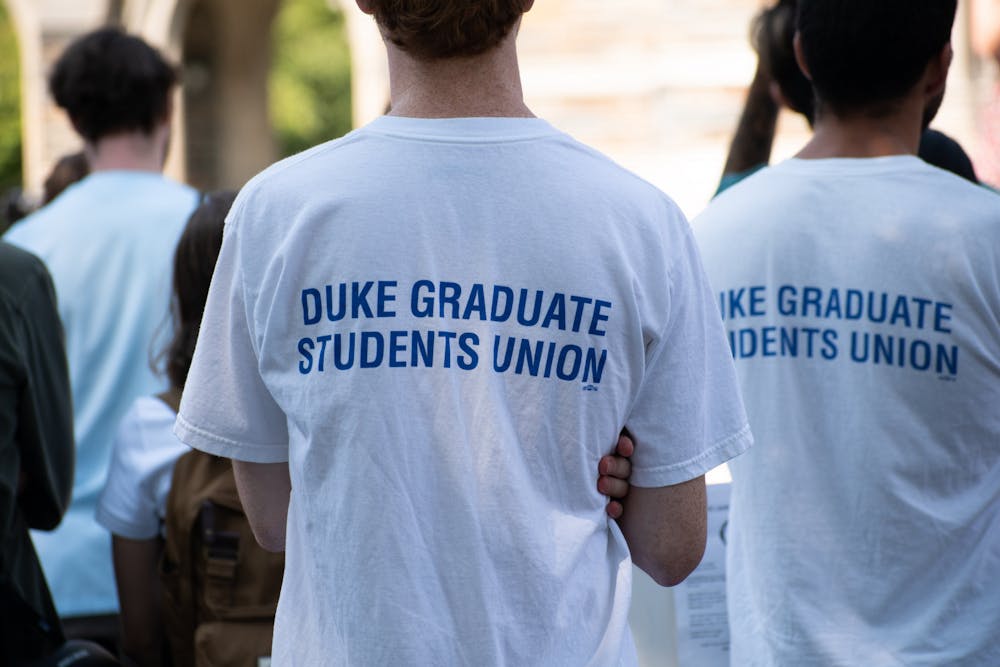As the Duke Graduate Students Union looks to achieve legal certification through a National Labor Relations Board-certified election, Duke and the union came to an agreement on a stipulation of facts at a March 27 hearing.
This stipulated agreement of facts, which DGSU requested to avoid the hearing process, “eliminates another roadblock in this series of roadblocks that Duke and Proskauer [Rose, the University’s representative law firm,] are trying to litigate,” said Jingxuan Zhang, a third-year doctoral candidate in the music department and the union’s secretary.
Zhang also noted that the union members expected the first day of the hearing to go until the late afternoon, but the hearing adjourned early. According to Anita Simha, DGSU co-chair and fourth-year doctoral candidate in the biology department, the hearings took eight business days during the union’s initial campaign in 2017.
“Stipulating speeds up the process by a lot [because] otherwise the [regional director of the NLRB] has to read the full transcript of the hearing to make his decision ... We can expect a decision sooner,” Simha wrote.
Duke has maintained its opposition to the union’s efforts. It is currently challenging a 2016 National Labor Relations Board decision that affirms the legal right for graduate students to unionize as employees.
The University views its relationship with graduate students as centered on education, training and mentorship, which it believes is “fundamentally different from that of employer to employee,” according to interim Provost Jennifer Francis.
The University made a similar attempt to overturn the NLRB decision in 2017, the last time graduate students attempted to unionize, but it was ultimately unsuccessful.
These agreements on facts include “virtually all the facts from the 2017 decision,” with updates “to reflect the modifications Duke has made to the graduate experience since then,” wrote Chris Simmons, vice president for government relations, in an email to The Chronicle.
The changes include Duke’s Re-imagining Doctoral Education committee, which provided recommendations for doctoral education reform and expanded summer programs to equip doctoral candidates with “important funding, training and professional development opportunities all year round,” according to Simmons.
Simmons then pointed to mentoring and career development programs such as Graduate Student Training Enhancement Grants, the Duke Graduate Academy, Program Mentoring Statements and the implementation of “Intellectual Development Plans” to help doctoral students establish long-term goals.
The list of changes also includes recommendations by the Ph.D. Stipend Task Force, which was composed of representatives from the Graduate School and student representatives, to increase doctoral student stipends, offer financial support for housing, and provide benefits, such as dental insurance and childcare subsidies. Simmons also pointed to tuition scholarships for Ph.D. students in their sixth year introduced in 2017, as well as stipend extensions and tuition and fee scholarships offered to sixth- and seventh-year doctoral candidates in the pandemic.
While the two parties agree on the facts, Zhang disagrees that the graduate experience has changed much with these initiatives.
“If you went to talk to any of my Ph.D. colleagues, we have all quickly recognized that not much has changed from our perspective,” he said. According to Zhang, the University is saying “that ‘Duke, by implementing this RiDE program, has fundamentally changed the nature of graduate students’ experience,’ which from the perspective of graduate students is a completely empty statement.”
While Zhang believes that Duke’s legal argument is flimsy, he believes that the University intends to delay a prospective election to weaken the union’s momentum.
The agreement of facts does not include terms for an election. The union has previously requested that the election be held by the end of March. Simmons believes that the election should be held “when a maximum number of students can vote and have fewer demands on their schedules” and at a time that “doesn’t interfere with exams or commencement.”
“That, again, is trying to delay the election and try to lessen our momentum. Maybe delay into the summer or maybe delay it into the next fall,” Zhang said. “We got a win in terms of this particular hearing, [but] Duke is continuing [its] anti-union campaign through delay tactics.”
The NLRB regional director will consider the stipulation of facts in determining the circumstances of an election, which can come either by agreement between the two parties or by the ruling of the regional director.
Correction: A previous version of this story incorrectly named the DGSU secretary. It was updated Monday evening to reflect that Jingxuan Zhang is the secretary. The Chronicle regrets the error.
Get The Chronicle straight to your inbox
Signup for our weekly newsletter. Cancel at any time.

Audrey Wang is a Trinity junior and editor-in-chief of The Chronicle's 119th volume.

